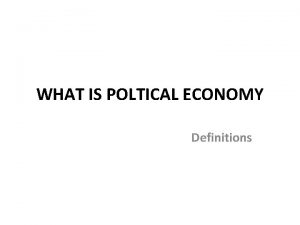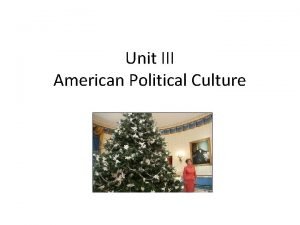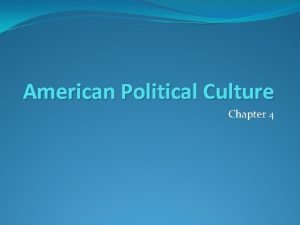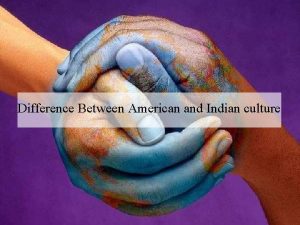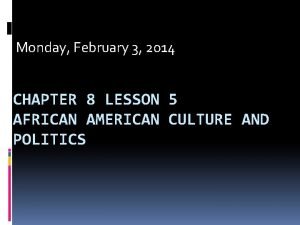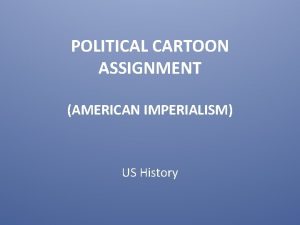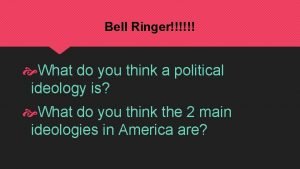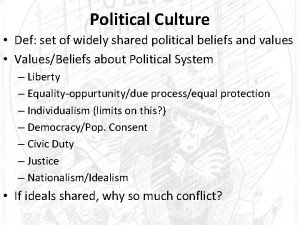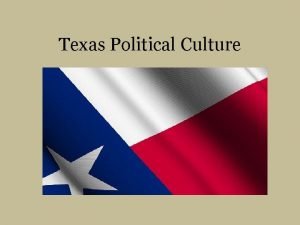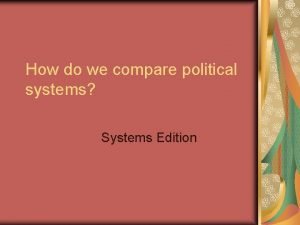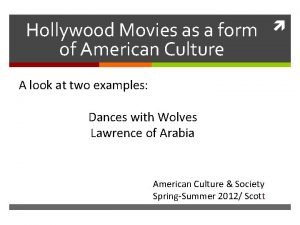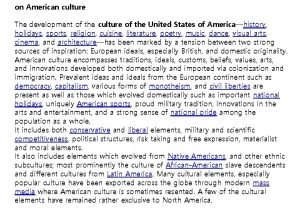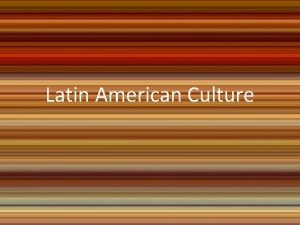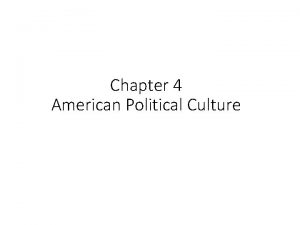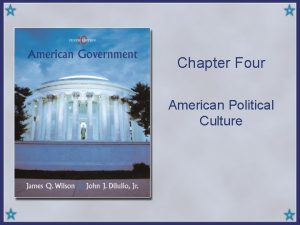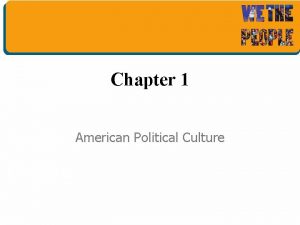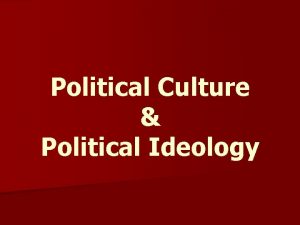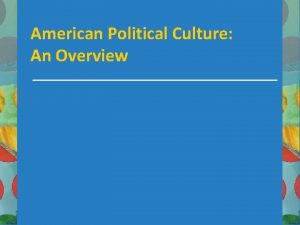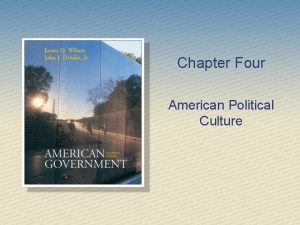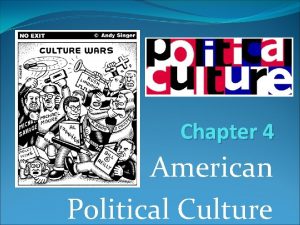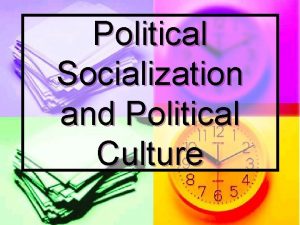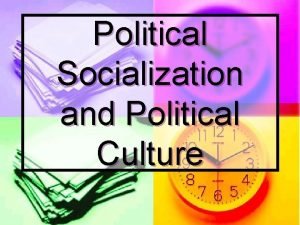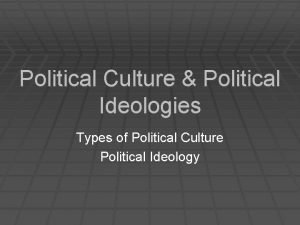AMERICAN POLITICAL CULTURE CHAPTER 4 POLTICAL CULTURE n














- Slides: 14

AMERICAN POLITICAL CULTURE CHAPTER 4

POLTICAL CULTURE n THE DISTINCTIVE AND PATTERNED WAY OF THINKING ABOUT HOW POLITICAL AND ECONOMIC LIFE OUGHT TO BE CARRIED OUT

OUR BELIEFS n THE AMERICAN POLITICAL SYSTEM IS BASED ON SOME CORE BELIEFS ¨ ¨ ¨ Personal Liberty Equality Democracy Civic Duty Individual Responsibility n n How do we know this is true? If this is true, how do we explain contrary behavior? If we agree so much on principle, why do we conflict? What is “Americanism”?

OUR BELIEFS n The American economic system is governed by two basic principles enterprise ¨ Some government regulation n ¨ Free n In America, we seem to be more willing to tolerate economic inequality than political inequality Oddly, it is the most liberal of groups that supports preferential treatment in the economic system Most Americans support the idea that the government should take care of those who are unable to care for themselves Still, the concepts of economic individualism and personal responsibility dominate the American Economic landscape

COMPARING OURSELVES IN GENERAL, AMERICANS TEND TO n Be more patriotic n Have a higher sense of civic duty and civic competence n Have more confidence in both public and private institutions n Be more individualistic and competitive n Be less interested in seeking harmony

COMPARING OURSELVES IN TERMS OF ECONOMICS, AMERCIANS TEND TO n Be less concerned with equality of results n Be less interested in the concept of equal pay n Believe freedom is more important than equality

THE CIVIC ROLE OF RELIGION America is one of the most religious countries in the world n It is getting more religious n Many Americans go to services as much for prayer as for civic importance n Though many Americans may be “Bowling Alone”, church membership rates have stayed fairly consistent n

RELIGION AND POLITICS n n n Religion has always played a significant political role This is especially true in regards to government supported faith-based programs 60% of Americans believe faith based programs are more efficient providers of charity and 40% said they do the best job of providing for those in need (vs. 25% for secular groups and 28% for gov. ) Wilson, p. 87

SOURCES OF POLITICAL CULTURE n n n This country was formed out of an adversarial, mistrusting relationship with government The Constitution is set up in such a way as to limit the power of any one group, thus providing for individual rights, such as religious freedom Though conflict did occur between Protestants and Catholics, the country seemed to develop out of a Puritan Ethic n PURITAN (PROTESTANT) ETHIC PERSONAL ACHIEVEMENT RELIGIOUS CONVICTION OBLIGATION TO WORK OBLIGATION TO SAVE MONEY ¨ OBLIGATION TO OBEY SECULAR LAW ¨ DO GOOD WORKS ¨ ¨

Sources cont… n n Churches acted as mini-political systems Most political attitude is derived for your family All factors combine to create a lack of “class consciousness” Most Americans still believe in Horatio Alger stories, resulting in a less popular Socialist Party and a general distaste for welfare programs

CULTURE WAR n n n Abortion Gay Rights Drugs School prayer Pornography Gambling n n n No money at stake Conflict comes from “moral core” Conservative vs. Progressive Conservative: morality is more important than selfexpression (Religious Right) Progressive: Personal freedom is #1 (Secular Humanism)

“DON’T TRUST THE GOVERNMENT” n n Trust has declined since the 1950’s Most people distrust the politicians, not the system n WHY? ¨ Vietnam ¨ Nixon ¨ Clinton ¨ 1950’s overly high view of government ¨ Environmentalism ¨ Iraq

POLITICAL EFFICACY: CITIZEN’S CAPACITY TO UNDERSTAND INFLUENCE POLITICS INTERNAL EFFICACY n Ability to understand take part n Not much change since mid 1960’s EXTERNAL EFFICACY n n Ability to make the system respond to the citizenry Drop since mid 1960’s No single reason, just a trend Still higher than in Europe

POLITICAL TOLERANCE n MOST AMERICANS BELIEVE IN THE 1 ST AMENDMENT, BUT ARE MORE WILLING TO SUSPEND THOSE RIGHTS IN SPECIFIC CASES Protestants holding a revival meeting 2. Right to life groups opposing abortion 3. Nuclear power protestors 4. Feminists marching for ERA 5. Gays organizing for homosexual rights 6. Atheists preaching against God 7. Students organizing a sit in at city hall Wilson, p. 94 1. n n n Intolerance, or civic concern? Are we intolerant if we cap rights but don’t deny them? We are getting more tolerant. How do these groups that most of us don’t like survive? Consensus on denial of rights? Role of courts
 What is poltical economy
What is poltical economy American political culture definition
American political culture definition American political culture definition
American political culture definition Difference between american and indian culture
Difference between american and indian culture Chapter 8 lesson 5 african american culture and politics
Chapter 8 lesson 5 african american culture and politics Political demonstrations on american campuses have abated
Political demonstrations on american campuses have abated American imperialism political cartoons explained
American imperialism political cartoons explained U.s. imperialism political cartoons
U.s. imperialism political cartoons American political spectrum
American political spectrum Political culture def
Political culture def Political culture of texas
Political culture of texas What is political culture
What is political culture Movies about american culture
Movies about american culture The development of an american culture
The development of an american culture American culture examples
American culture examples
